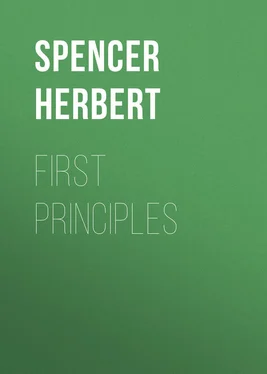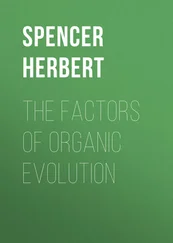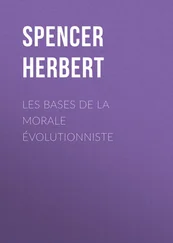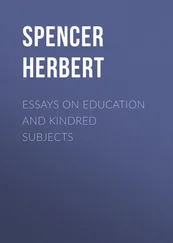Herbert Spencer - First Principles
Здесь есть возможность читать онлайн «Herbert Spencer - First Principles» — ознакомительный отрывок электронной книги совершенно бесплатно, а после прочтения отрывка купить полную версию. В некоторых случаях можно слушать аудио, скачать через торрент в формате fb2 и присутствует краткое содержание. Жанр: Философия, foreign_antique, foreign_prose, на английском языке. Описание произведения, (предисловие) а так же отзывы посетителей доступны на портале библиотеки ЛибКат.
- Название:First Principles
- Автор:
- Жанр:
- Год:неизвестен
- ISBN:нет данных
- Рейтинг книги:5 / 5. Голосов: 1
-
Избранное:Добавить в избранное
- Отзывы:
-
Ваша оценка:
- 100
- 1
- 2
- 3
- 4
- 5
First Principles: краткое содержание, описание и аннотация
Предлагаем к чтению аннотацию, описание, краткое содержание или предисловие (зависит от того, что написал сам автор книги «First Principles»). Если вы не нашли необходимую информацию о книге — напишите в комментариях, мы постараемся отыскать её.
First Principles — читать онлайн ознакомительный отрывок
Ниже представлен текст книги, разбитый по страницам. Система сохранения места последней прочитанной страницы, позволяет с удобством читать онлайн бесплатно книгу «First Principles», без необходимости каждый раз заново искать на чём Вы остановились. Поставьте закладку, и сможете в любой момент перейти на страницу, на которой закончили чтение.
Интервал:
Закладка:
“Supposing the Absolute to become a cause, it will follow that it operates by means of freewill and consciousness. For a necessary cause cannot be conceived as absolute and infinite. If necessitated by something beyond itself, it is thereby limited by a superior power; and if necessitated by itself, it has in its own nature a necessary relation to its effect. The act of causation must therefore be voluntary; and volition is only possible in a conscious being. But consciousness again is only conceivable as a relation. There must be a conscious subject, and an object of which he is conscious. The subject is a subject to the object; the object is an object to the subject; and neither can exist by itself as the absolute. This difficulty, again, may be for the moment evaded, by distinguishing between the absolute as related to another and the absolute as related to itself. The Absolute, it may be said, may possibly be conscious, provided it is only conscious of itself. But this alternative is, in ultimate analysis, no less self-destructive than the other. For the object of consciousness, whether a mode of the subject’s existence or not, is either created in and by the act of consciousness, or has an existence independent of it. In the former case, the object depends upon the subject, and the subject alone is the true absolute. In the latter case, the subject depends upon the object, and the object alone is the true absolute. Or if we attempt a third hypothesis, and maintain that each exists independently of the other, we have no absolute at all, but only a pair of relatives; for coexistence, whether in consciousness or not, is itself a relation.”
“The corollary from this reasoning is obvious. Not only is the Absolute, as conceived, incapable of a necessary relation to anything else; but it is also incapable of containing, by the constitution of its own nature, an essential relation within itself; as a whole, for instance, composed of parts, or as a substance consisting of attributes, or as a conscious subject in antithesis to an object. For if there is in the absolute any principle of unity, distinct from the mere accumulation of parts or attributes, this principle alone is the true absolute. If, on the other hand, there is no such principle, then there is no absolute at all, but only a plurality of relatives. The almost unanimous voice of philosophy, in pronouncing that the absolute is both one and simple, must be accepted as the voice of reason also, so far as reason has any voice in the matter. But this absolute unity, as indifferent and containing no attributes, can neither be distinguished from the multiplicity of finite beings by any characteristic feature, nor be identified with them in their multiplicity. Thus we are landed in an inextricable dilemma. The Absolute cannot be conceived as conscious, neither can it be conceived as unconscious: it cannot be conceived as complex, neither can it be conceived as simple: it cannot be conceived by difference, neither can it be conceived by the absence of difference: it cannot be identified with the universe, neither can it be distinguished from it. The One and the Many, regarded as the beginning of existence, are thus alike incomprehensible.”
“The fundamental conceptions of Rational Theology being thus self-destructive, we may naturally expect to find the same antagonism manifested in their special applications. * * * How, for example, can Infinite Power be able to do all things, and yet Infinite Goodness be unable to do evil? How can Infinite Justice exact the utmost penalty for every sin, and yet Infinite Mercy pardon the sinner? How can Infinite Wisdom know all that is to come, and yet Infinite Freedom be at liberty to do or to forbear? How is the existence of Evil compatible with that of an infinitely perfect Being; for if he wills it, he is not infinitely good; and if he wills it not, his will is thwarted and his sphere of action limited?” * * *
“Let us, however, suppose for an instant that these difficulties are surmounted, and the existence of the Absolute securely established on the testimony of reason. Still we have not succeeded in reconciling this idea with that of a Cause: we have done nothing towards explaining how the absolute can give rise to the relative, the infinite to the finite. If the condition of casual activity is a higher state than that of quiescence, the Absolute, whether acting voluntarily or involuntarily, has passed from a condition of comparative imperfection to one of comparative perfection; and therefore was not originally perfect. If the state of activity is an inferior state to that of quiescence, the Absolute, in becoming a cause, has lost its original perfection. There remains only the supposition that the two states are equal, and the act of creation one of complete indifference. But this supposition annihilates the unity of the absolute, or it annihilates itself. If the act of creation is real, and yet indifferent, we must admit the possibility of two conceptions of the absolute, the one as productive, the other as non-productive. If the act is not real, the supposition itself vanishes.” * * *
“Again, how can the relative be conceived as coming into being? If it is a distinct reality from the absolute, it must be conceived as passing from non-existence into existence. But to conceive an object as non-existent, is again a self-contradiction; for that which is conceived exists, as an object of thought, in and by that conception. We may abstain from thinking of an object at all; but, if we think of it, we cannot but think of it as existing. It is possible at one time not to think of an object at all, and at another to think of it as already in being; but to think of it in the act of becoming, in the progress from not being into being, is to think that which, in the very thought, annihilates itself.” * * *
“To sum up briefly this portion of my argument. The conception of the Absolute and Infinite, from whatever side we view it, appears encompassed with contradictions. There is a contradiction in supposing such an object to exist, whether alone or in conjunction with others; and there is a contradiction in supposing it not to exist. There is a contradiction in conceiving it as one; and there is a contradiction in conceiving it as many. There is a contradiction in conceiving it as personal; and there is a contradiction in conceiving it as impersonal. It cannot, without contradiction, be represented as active; nor, without equal contradiction, be represented as inactive. It cannot be conceived as the sum of all existence; nor yet can it be conceived as a part only of that sum.”
§ 14. And now what is the bearing of these results on the question before us? Our examination of Ultimate Religious Ideas has been carried on with the view of making manifest some fundamental verity contained in them. Thus far however we have arrived at negative conclusions only. Criticising the essential conceptions involved in the different orders of beliefs, we find no one of them to be logically defensible. Passing over the consideration of credibility, and confining ourselves to that of conceivability, we see that Atheism, Pantheism, and Theism, when rigorously analysed, severally prove to be absolutely unthinkable. Instead of disclosing a fundamental verity existing in each, our investigation seems rather to have shown that there is no fundamental verity contained in any. To carry away this conclusion, however, would be a fatal error; as we shall shortly see.
Leaving out the accompanying moral code, which is in all cases a supplementary growth, every Religion may be defined as an à priori theory of the Universe. The surrounding facts being given, some form of agency is alleged which, in the opinion of those alleging it, accounts for these facts. Be it in the rudest Fetishism, which assumes a separate personality behind every phenomenon; be it in Polytheism, in which these personalities are partially generalized; be it in Monotheism, in which they are wholly generalized; or be it in Pantheism, in which the generalized personality becomes one with the phenomena; we equally find an hypothesis which is supposed to render the Universe comprehensible. Nay, even that which is commonly regarded as the negation of all Religion – even positive Atheism, comes within the definition; for it, too, in asserting the self-existence of Space, Matter, and Motion, which it regards as adequate causes of every appearance, propounds an à priori theory from which it holds the facts to be deducible. Now every theory tacitly asserts two things: firstly, that there is something to be explained; secondly, that such and such is the explanation. Hence, however widely different speculators may disagree in the solutions they give of the same problem; yet by implication they agree that there is a problem to be solved. Here then is an element which all creeds have in common. Religions diametrically opposed in their overt dogmas, are yet perfectly at one in the tacit conviction that the existence of the world with all it contains and all which surrounds it, is a mystery ever pressing for interpretation. On this point, if on no other, there is entire unanimity.
Читать дальшеИнтервал:
Закладка:
Похожие книги на «First Principles»
Представляем Вашему вниманию похожие книги на «First Principles» списком для выбора. Мы отобрали схожую по названию и смыслу литературу в надежде предоставить читателям больше вариантов отыскать новые, интересные, ещё непрочитанные произведения.
Обсуждение, отзывы о книге «First Principles» и просто собственные мнения читателей. Оставьте ваши комментарии, напишите, что Вы думаете о произведении, его смысле или главных героях. Укажите что конкретно понравилось, а что нет, и почему Вы так считаете.












